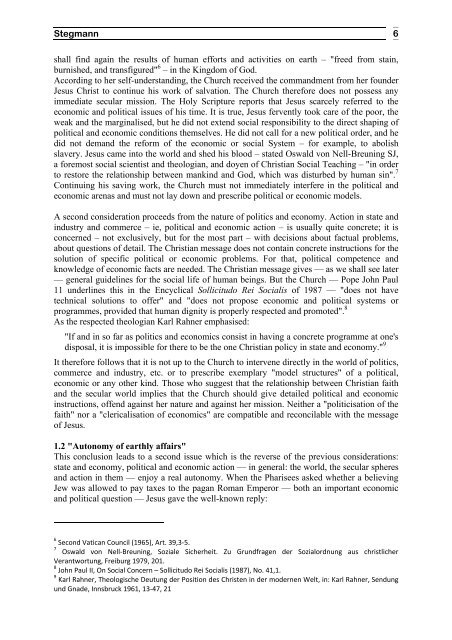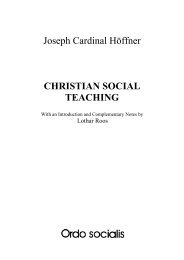Prof. Franz Josef Stegmann Bethlehem Social ... - Ordo Socialis
Prof. Franz Josef Stegmann Bethlehem Social ... - Ordo Socialis
Prof. Franz Josef Stegmann Bethlehem Social ... - Ordo Socialis
You also want an ePaper? Increase the reach of your titles
YUMPU automatically turns print PDFs into web optimized ePapers that Google loves.
<strong>Stegmann</strong><br />
shall find again the results of human efforts and activities on earth – "freed from stain,<br />
burnished, and transfigured" 6 – in the Kingdom of God.<br />
According to her self-understanding, the Church received the commandment from her founder<br />
Jesus Christ to continue his work of salvation. The Church therefore does not possess any<br />
immediate secular mission. The Holy Scripture reports that Jesus scarcely referred to the<br />
economic and political issues of his time. It is true, Jesus fervently took care of the poor, the<br />
weak and the marginalised, but he did not extend social responsibility to the direct shaping of<br />
political and economic conditions themselves. He did not call for a new political order, and he<br />
did not demand the reform of the economic or social System – for example, to abolish<br />
slavery. Jesus came into the world and shed his blood – stated Oswald von Nell-Breuning SJ,<br />
a foremost social scientist and theologian, and doyen of Christian <strong>Social</strong> Teaching – "in order<br />
to restore the relationship between mankind and God, which was disturbed by human sin". 7<br />
Continuing his saving work, the Church must not immediately interfere in the political and<br />
economic arenas and must not lay down and prescribe political or economic models.<br />
A second consideration proceeds from the nature of politics and economy. Action in state and<br />
industry and commerce – ie, political and economic action – is usually quite concrete; it is<br />
concerned – not exclusively, but for the most part – with decisions about factual problems,<br />
about questions of detail. The Christian message does not contain concrete instructions for the<br />
solution of specific political or economic problems. For that, political competence and<br />
knowledge of economic facts are needed. The Christian message gives — as we shall see later<br />
— general guidelines for the social life of human beings. But the Church — Pope John Paul<br />
11 underlines this in the Encyclical Sollicitudo Rei <strong>Social</strong>is of 1987 — "does not have<br />
technical solutions to offer" and "does not propose economic and political systems or<br />
programmes, provided that human dignity is properly respected and promoted". 8<br />
As the respected theologian Karl Rahner emphasised:<br />
"If and in so far as politics and economics consist in having a concrete programme at one's<br />
disposal, it is impossible for there to be the one Christian policy in state and economy." 9<br />
It therefore follows that it is not up to the Church to intervene directly in the world of politics,<br />
commerce and industry, etc. or to prescribe exemplary "model structures" of a political,<br />
economic or any other kind. Those who suggest that the relationship between Christian faith<br />
and the secular world implies that the Church should give detailed political and economic<br />
instructions, offend against her nature and against her mission. Neither a "politicisation of the<br />
faith" nor a "clericalisation of economics" are compatible and reconcilable with the message<br />
of Jesus.<br />
1.2 "Autonomy of earthly affairs"<br />
This conclusion leads to a second issue which is the reverse of the previous considerations:<br />
state and economy, political and economic action — in general: the world, the secular spheres<br />
and action in them — enjoy a real autonomy. When the Pharisees asked whether a believing<br />
Jew was allowed to pay taxes to the pagan Roman Emperor — both an important economic<br />
and political question — Jesus gave the well-known reply:<br />
6<br />
Second Vatican Council (1965), Art. 39,3‐5.<br />
7<br />
Oswald von Nell‐Breuning, Soziale Sicherheit. Zu Grundfragen der Sozialordnung aus christlicher<br />
Verantwortung, Freiburg 1979, 201.<br />
8<br />
John Paul II, On <strong>Social</strong> Concern – Sollicitudo Rei <strong>Social</strong>is (1987), No. 41,1.<br />
9<br />
Karl Rahner, Theologische Deutung der Position des Christen in der modernen Welt, in: Karl Rahner, Sendung<br />
und Gnade, Innsbruck 1961, 13‐47, 21<br />
6















